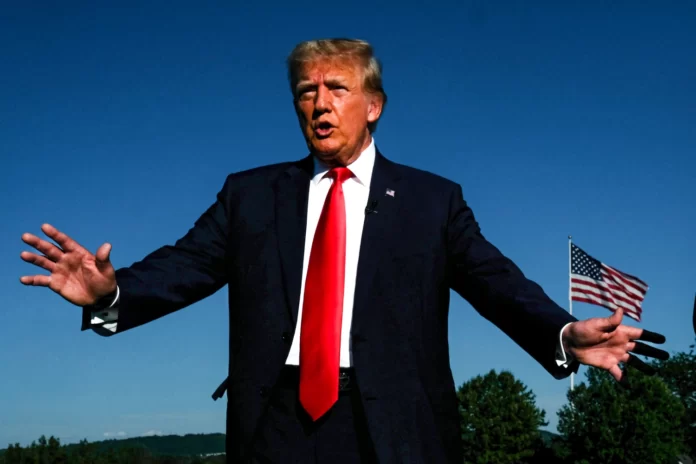Former President Donald Trump faced widespread condemnation after making controversial comments regarding the landmark Supreme Court decision Roe v. Wade. During a recent interview, Trump claimed that the ruling allowed women “to kill the baby after birth,” sparking outrage and criticism from various quarters.
Trump’s statement, made during an appearance on a conservative podcast, reignited the debate over reproductive rights and abortion laws in the United States. Roe v. Wade, a historic 1973 Supreme Court decision, established a woman’s legal right to choose abortion without excessive government intervention. However, Trump’s assertion about post-birth abortion contradicts the ruling’s actual provisions.
Critics swiftly denounced Trump’s remarks, highlighting the factual inaccuracy and the inflammatory nature of his statement. Democratic lawmakers, reproductive rights advocates, and medical professionals were among those who condemned Trump’s comments, emphasizing the importance of accurate information and respecting women’s reproductive autonomy.
In response to the backlash, Trump’s representatives attempted to clarify his statement, suggesting that he misspoke or was misunderstood. However, the damage was already done, with many expressing concern about the potential impact of such misleading statements on public discourse and policy-making.
The controversy surrounding Trump’s comments underscored the ongoing battle over abortion rights in the United States. With the Supreme Court currently considering a case that could potentially overturn or severely restrict Roe v. Wade, the issue has once again become a focal point of national debate.
Trump Controversial
Proponents of abortion rights argued that Trump’s remarks were part of a broader strategy to undermine reproductive freedoms and stigmatize women who seek abortion services. They warned against the spread of misinformation. And urged for policies that safeguard women’s access to safe and legal abortion care.
Conversely, anti-abortion activists welcomed Trump’s remarks, viewing them as validation of their efforts to promote a pro-life agenda. They reiterated their commitment to advancing legislation aimed at restricting abortion rights and protecting the sanctity of life.
The fallout from Trump’s controversial statement reignited calls for greater public education on reproductive health and rights. Advocates emphasized the importance of accurate information and open dialogue to counter misinformation and ensure that women can make informed decisions about their reproductive healthcare.
Amidst the uproar, some political analysts speculated about the potential impact of Trump’s comments on the broader political landscape. They noted that Trump’s vocal stance on abortion could galvanize his conservative base ahead of upcoming elections, while also potentially alienating moderate voters.
Furthermore, Trump’s remarks prompted renewed scrutiny of his administration’s policies and actions related to reproductive rights. During his presidency, Trump pursued various measures aimed at restricting access to abortion, including appointing anti-abortion judges to federal courts and implementing regulations that limited funding for reproductive healthcare providers.
In light of these actions, critics accused Trump of pursuing a regressive agenda that undermined women’s rights and reproductive healthcare access. They argued that his recent comments reflected a continuation of his administration’s efforts to roll back reproductive freedoms and prioritize anti-abortion interests.
Meanwhile, advocates for reproductive rights reiterated their commitment to protecting and expanding access to abortion services. They emphasized the importance of defending Roe v. Wade and ensuring that women have access to comprehensive reproductive healthcare, including contraception, prenatal care, and abortion services.
The controversy surrounding Trump’s comments also reignited discussions about the broader implications of abortion policy in the United States. Beyond the legal and political dimensions, the debate touched upon ethical, moral, and religious considerations, highlighting the complex and deeply entrenched nature of the issue.
As the debate unfolded, public figures, healthcare professionals, and advocacy organizations weighed in with diverse perspectives and opinions. While opinions on abortion remained deeply divided, the controversy prompted renewed calls for dialogue, empathy, and understanding across ideological lines.
Ultimately, Trump’s remarks served as a stark reminder of the enduring significance of abortion rights in American society and the ongoing struggle to secure and protect those rights. The controversy sparked by his comments underscored the need for continued vigilance and advocacy to safeguard reproductive freedoms for all individuals.

